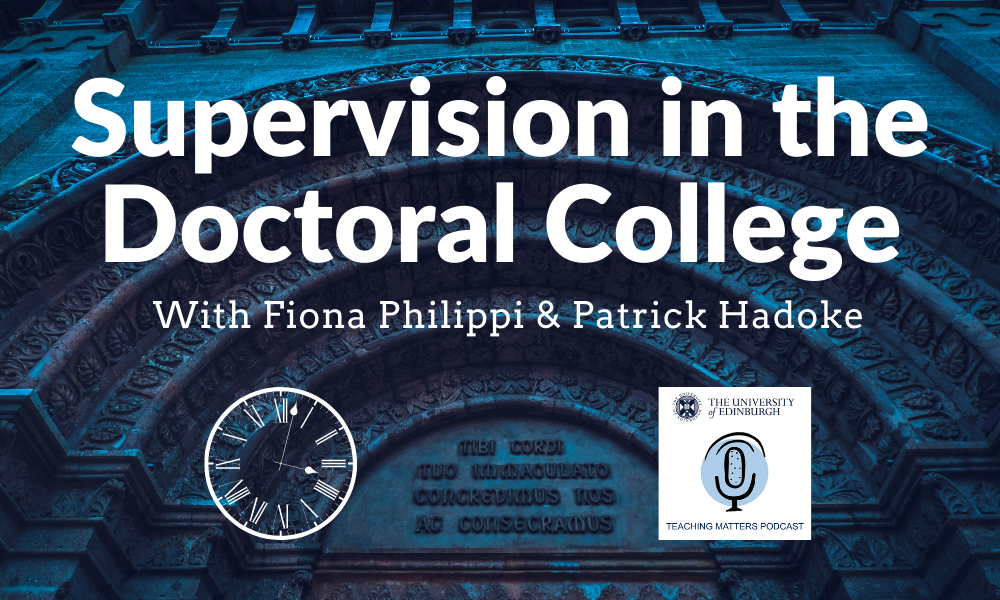
Fiona Philippi, Head of Doctoral Education, interviews Patrick Hadoke, tapping into his experience in PhD supervision. Their conversation showcases the interpersonal aspect of supervision in the Doctoral College, discusses time as a limiting factor for PhD students, and offers guidance for incoming supervisors. This post and podcast accompany July-August’s Learning and Teaching Enhancement theme: Showcasing the Doctoral College.
A transcript is provided and, for ease, the main themes are discussed at these times in the recording:
0.44 Overview of experience as a research supervisor, the most enjoyable and most challenging aspects
4.59 Experience of completing the UK Council for Graduate Education (UKCGE) research supervision recognition programme
9.59 Advice and tips for new PhD supervisors
We know that supervision plays a key part in supporting postgraduate researchers to successful completion of their degree, and that as research degrees have developed and evolved, the supervisory role has also become increasingly complex and in many ways more demanding (see for example Lee (2019), Taylor, Kiley and Humphrey (2018)). The Doctoral College is committed to supporting and enhancing research supervision at the University of Edinburgh and helps coordinate the various training initiatives and support available to supervisors. A core element of this is the online IAD course ‘Fundamentals of PhD Supervision’ which new supervisors are expected to complete and continuing supervisors complete every five years. This comprehensive course is complemented by mental health training run by the wellbeing services, optional courses from IAD, and local level briefing sessions (run by Graduate Schools or equivalent). Looking forward, plans are afoot to support a small cohort of supervisors to complete the UK Council for Graduate Education (UKCGE) Research Supervision Recognition Programme via an institutional-level programme. More details about this will be communicated to supervisors in the new academic year.
In this podcast, I speak to Professor Patrick Hadoke, who is the Personal Chair of Arterial Remodelling and the Director of Postgraduate Student and Early Career Researcher Experience in the College of Medicine and Veterinary Medicine. He speaks generally about his experiences as a research supervisor and more specifically about his reflections on completing the UKCGE programme. He also shares some excellent insights and tips for those who are starting out as new supervisors and indeed for anyone else who has an interest in research supervision. A key takeaway for me was the emphasis he places on the human side of supervision, something which he stresses should not be overlooked even in a busy, high-pressure research environment.
References:
Lee, A. (2019) Successful Research Supervision. 2nd Ed. London, Routledge.
Taylor, S., Kiley, M. and Humphrey, R. (2018) A Handbook for Doctoral Supervisors. London, Routledge.
 Paddy Hadoke
Paddy Hadoke
Prof. Hadoke joined the University of Edinburgh in 1994, having studied an Undergraduate degree (Applied Chemistry with Biochemistry) at the Polytechnic of Newcastle-upon-Tyne, and a Postgraduate degree (PhD, Physiology & Pharmacology) at Strathclyde University. His role enables him to combine teaching, research and student/staff support. He’s taught undergraduate and postgraduate students since 1995 and co-organises an Honours Elective in Cardiovascular Pharmacology and Therapeutics. His research interests centre on mechanisms that regulate arterial function and structure in health and disease, focussing on the role of the endothelium, new blood vessel formation (angiogenesis), and lesion formation (atherosclerosis, neointimal proliferation). His group uses a combination of in vitro, ex vivo and in vivo techniques to address these topics, with a strong focus on the use of novel imaging techniques to improve analysis. As CMVM Director of PGS & ECR Experience, he convenes the College Postgraduate Board of Examiners and Researcher Experience Committee and is responsible for pastoral support of PGR students and Early Career Researcher in his College.
 Fiona Philippi
Fiona Philippi
Dr Fiona Philippi is the Head of Doctoral Education at the Institute for Academic Development. She joined the University in 2013 and has oversight for the IAD programme of professional and personal development training and support for postgraduate researchers and research supervisors. She is also Manager of the Doctoral College.
Produced and Edited by:
 Eric Berger
Eric Berger
Eric is a Mathematics and Statistics student at the University of Edinburgh and a podcasting intern for Teaching Matters. Eric is passionate about university student mental health, interviewing researchers for the Student Mental Health Research Network at King’s College London, leading the University of Edinburgh’s WellComm Kings Peer Support Scheme, and conducting research on stigma for People With Mental Illnesses (PWMI). In his free time he enjoys watching and playing sports, over-analysing hip-hop songs, podcasts, and any sort of wholesome shenanigans.

